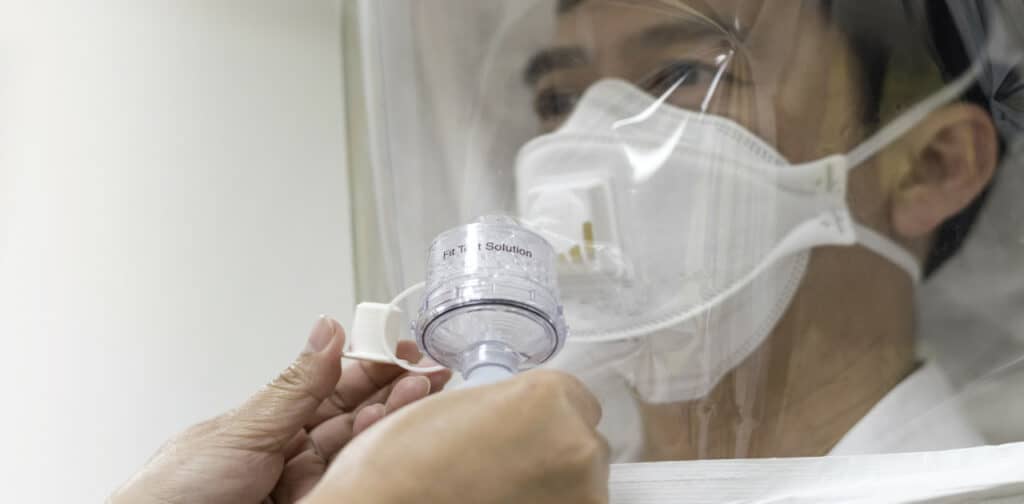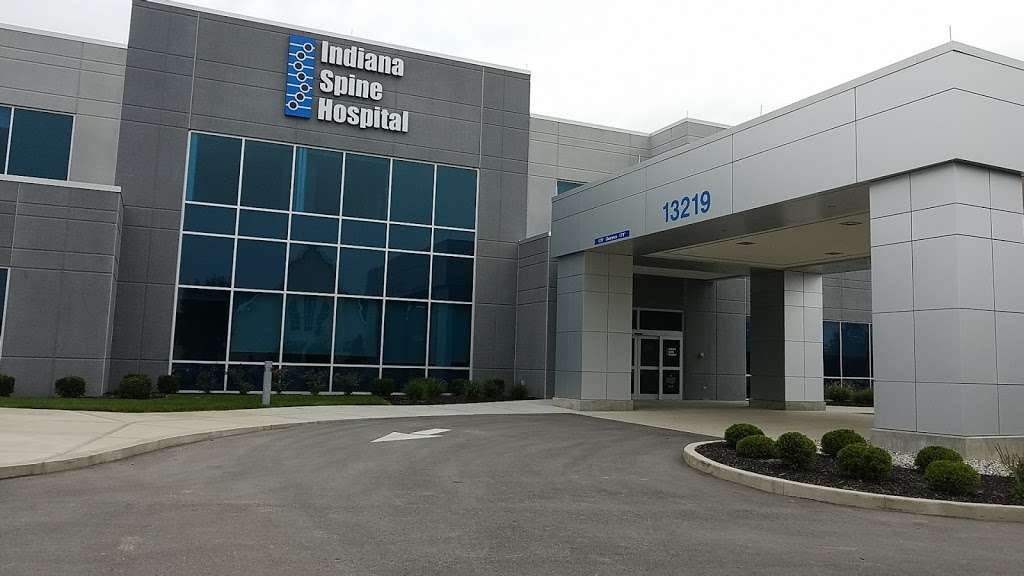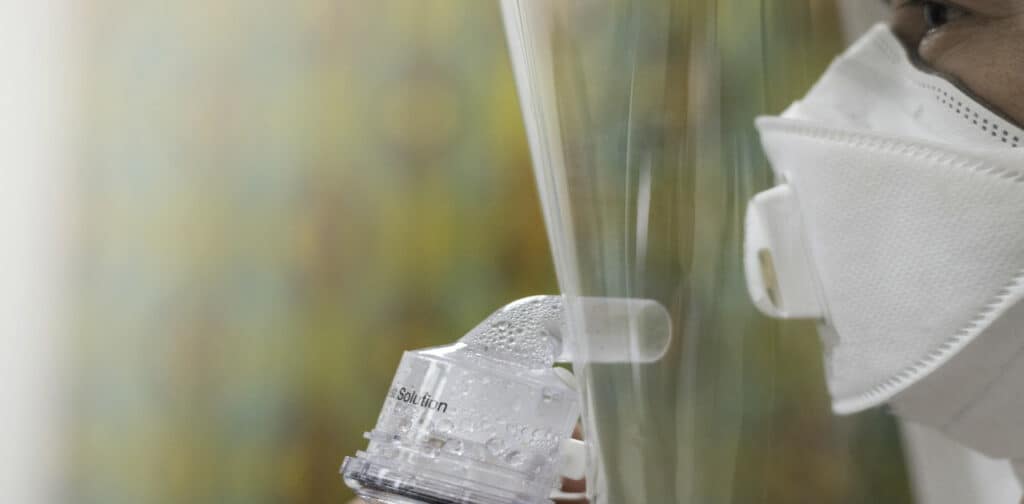
You never see it on TV medical dramas, but N95 and KN95 masks and respirators don’t just come out of a box one-size-fits-all. N95 and KN95 masks must be fit tested to ensure a complete fit. Similar to a diving mask that leaks small amounts of water, a surgical mask or respirator that leaks small amounts of air is rendered ineffective against infection control.
The Occupational Safety and Health Administration (OSHA) requires respirator fit testing to confirm a proper fit of any respirator that forms a tight seal on your face before using it in the workplace. These masks and respirators are common in dental offices, ambulatory surgical centers like the Indiana Spine Hospital, and medical hospitals.
Fit testing, however, requires specialized equipment since airflow is challenging to visualize or measure. Vantage Point Consulting began offering fit testing in 2021. The Indiana Spine Hospital, located in Carmel, Indiana just north of Indianapolis, was the first institution to use VPC for fit testing and received a complete fit testing solution with some challenges through the process.
CHALLENGES
- Small and mid-size medical centers don’t have fit testing equipment on-site.
- Fit-testing is hard to source, with few qualified providers in the region.
- Existing fit test providers are cumbersome or geographically distant.
- Fit testing must be done annually or semi-annually to accommodate staff turnover and weight changes.
- Fit testing became critical during COVID-19, but many smaller facilities weren’t able to find or complete testing.
- Infection control of the testing device is critical.
SOLUTIONS
- VPC purchased equipment to offer an affordable solution for small and mid-size medical centers.
- VPC created a flexible system to fit test staff after their physicals were completed.
- VPC later implemented infection control protocols for the fit testing device.
Smaller surgical centers can conduct their own physicals

Before undergoing fit testing, individuals must first receive a physical exam from a nurse practitioner or physician. This exam looks for breathing issues or respiratory problems that might preclude someone from undergoing fit testing.
Small and mid-size ambulatory surgical centers can save on third-party costs by using internal staff to conduct physical exams on staff.
Terri Bogue is the infection preventionist at Indiana Spine Hospital and conducted their physicals. A few staff members were omitted from the fit testing as a result.
“Most hospitals do fit testing annually, but we’re a small hospital and didn’t have much reason to fit test until COVID-19,” says Bogue. “Lots of larger places do this with their own equipment, but during COVID it got harder to find that equipment.”
How the fit testing process works
Using the OSHA protocol for fit testing, each mask fit test takes about 5-10 minutes to complete.
- First, a nebulizer sprays a bitter or sweet-testing and smelling mist into the person’s mouth, similar to an aerosol breath spray. This determines if the person being tested can recognize the smell or taste of the nebulizer.
- The user puts on the N95 mask or respirator and adjusts the seal around their face.
- A special bag-like hood is placed over the user’s head, similar to the hood common in white HazMat suits. A valve is shut at the bottom to form an air seal.
- The test administrator will spray a nebulizer into the hood.
- The user runs through 8 exercises to test the fit, including normal breathing, deep breathing, turning their head in various directions, grimacing, bending over, and reading text aloud.
- If the user can smell or taste the nebulizer, the mask doesn’t fit. If they can’t, the mask is a good fit and forms a tight enough seal to prevent air leaks.

Challenges and problems during fit testing
“We had worked with VPC through various tabletop exercises in the past. We liked the team at Vantage Point, they were willing to listen, and VPC was always kind to us,” says Bogue.
“They did a great job of getting people in and out, and if people needed to come early, they accommodated them,” Bogue says, adding, “However, the fit testing didn’t go as well as I would have liked.” Bogue identified two problems.
Initially, the VPC team was not cleaning the hoods and testing equipment to the standards of the client. Once noted, VPC quickly revised the process to comply. On one of the several test visits, the testing team miscommunicated the location of the necessary fit testing equipment and caused a short delay in order to retrieve it. “We talked about it,” says Bogue.
Troy Jester, President of Vantage Point Consulting took full responsibility for the two issues. “At VPC we always expect everything within a project to go smoothly and not have any issues, but that is not always the outcome!” This project is a new process for VPC and we had a couple of issues to improve upon. VPC maintains an improvement plan for these issues to ensure they do not reoccur. Another challenge we experienced during this project was some of those who had COVID previously could not smell or detect the fit-testing solutions.
Fifteen minutes was allocated for each test, and approximately 60 staff members at Indiana Spine Hospital were tested. “They were very flexible, and when we didn’t have people scheduled they were willing to work with us,” says Bogue, noting each test was completed in about 5-10 minutes on average.
VPC has learned from and incorporated new standards and protocols to ensure safe and successful tests in the future.
Significant savings in time and hassle
Indiana Spine Hospital was able to conduct the fit testing for nearly all of their staff without sourcing the equipment, much of which is not used much throughout the year. And they saved on staff time by not removing a physician or nurse to conduct testing all day, further reducing their costs and keeping internal teams focused on patients.
“Having someone else come in and do this saves us a lot of time and energy,” says Bogue.
To request a fit testing for your ASC, office, or team, contact Vantage Point Consulting.

















